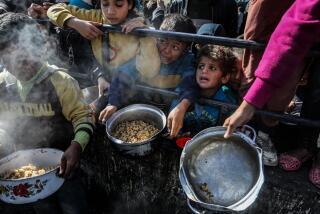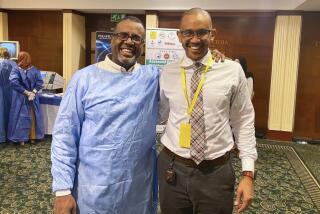‘We Are Not Such Monsters’
- Share via
LAHORE, Pakistan — Pakistan’s foremost orthopedic surgeon, Amer Aziz, once treated Al Qaeda leader Osama bin Laden and for years has provided medical aid to other Islamic hard-liners.
Now the 49-year-old physician works alongside one of Pakistan’s most prominent extremist groups to assist survivors of the Oct. 8 earthquake that killed 86,000 people in the nation. For Aziz, known for his free treatment of the poor, it’s the most expedient way to reach the sick and wounded in this isolated mountain region. But there’s a rub.
Many of these extremist organizations, which have been deemed terrorist groups by both the United States and Pakistan, have fashioned an uneasy truce with U.S. soldiers ferrying relief supplies to the 3.2 million people left homeless by the quake. And Aziz has had some unpleasant experiences with U.S. authorities: CIA and FBI operatives in 2002 detained the Pakistani surgeon for a month to interrogate him about his connections to Al Qaeda.
In the city of Muzaffarabad, the capital of the Pakistan-controlled portion of the Kashmir region, Aziz manages a field hospital run by Jamaat-ud-Dawa. The group has connections to Lashkar-e-Taiba, a Muslim militant group fighting Indian rule in disputed Kashmir. Taiba has been linked by U.S. authorities to Al Qaeda. Pakistan banned the organization in 2002.
At a relief camp packed with tents stamped with Dawa’s name, Aziz and his staff try to ignore the aid-ferrying U.S. helicopters flying overhead.
“I don’t trust Americans -- not after what I went through,” Aziz said. “But I am not doing anything wrong, so I don’t care if their Army is here. They do their bit, I do mine.”
As for Americans working alongside suspected terrorist groups, Nida Emmons, a spokeswoman for the U.S. Embassy in Islamabad, said, “As always, we take every precaution to ensure the safety and security of our humanitarian assistance workers and military personnel.”
Experts have taken note that there have not been attacks on American troops by extremists here. “The lack of violence means that most Pakistanis appreciate the U.S. assistance,” said Akbar Ahmed, the chairman of Islamic studies at American University in Washington, D.C.
Aziz established a rotating team of surgeons at this Dawa camp shortly after the quake. He has also treated for free 80 victims of spinal cord injuries at his Lahore hospital and provided shelter for their families.
“The world has seen that these bearded people have done good work, that we are not such monsters after all,” said Aziz, scoffing at the notion that such groups are banned in Pakistan. “Whatever word comes from Washington is the official stance of our government. The reality is these people are the best workers.”
Although he says he does not advocate violence, Aziz is one of Pakistan’s staunchest critics of the U.S. In an interview in his office in Lahore, the British-trained doctor discussed his meetings with Bin Laden, his detainment and the humanitarian efforts of religious extremists.
Groups such as Jamaat-ud-Dawa were in many cases the first to reach isolated mountain villages in the chaotic hours and days after the earthquake, he said. Ayman Zawahiri, Bin Laden’s No. 2, had called on Muslims to provide aid to the quake victims.
Aziz said 300 teams from various other groups had also moved into the mountains to assist isolated residents, rebuilding shattered homes with existing materials, including roofs made from sheet metal hauled in by donkey.
Aziz, who says he is not a member of any political party, has been rendering aid to the region’s militant groups since 1989.
“I believe in Islam. I am proud of it, and I am not apologizing for it,” he said. “But I don’t judge people on the basis of my beliefs, and I don’t advocate killing innocent people.”
He has no regrets for treating Bin Laden, who is thought to be hiding along the rugged boundary between Pakistan and Afghanistan, where Pakistani officials have little control and tribal loyalties run deep.
On a visit to an Afghan hospital in 1999, Aziz stayed at a Taliban guesthouse where Bin Laden was brought to see him.
“They just told me they wanted to bring me a patient. It was nothing serious. He had fallen off a horse,” Aziz said. “I was assisting the Taliban government at the time. It was nothing secret. I was not on their payroll. It was purely a humanitarian effort.”
He said he examined Bin Laden for 10 minutes, treating him only for back pain. “He was very humble, very soft-spoken,” Aziz said.
Aziz met Bin Laden for the second time in November 2001, two months after the terrorist attacks on the U.S. Aziz was in the process of establishing a surgical unit at the University of Jalalabad in Afghanistan to treat people injured during the U.S. bombing there.
“It was a bit awkward,” Aziz said. “I can’t speak Arabic, and he can’t speak English. But there were interpreters so we had a few minutes of small talk.”
He saw no evidence that the Al Qaeda mastermind suffered from kidney disease, as has been claimed by several intelligence experts. “He looked healthy,” Aziz said.
Nearly a year later, in October 2002, Pakistani agents arrested Aziz at his Lahore hospital and took him to a safe house in Islamabad, where he was confined to a bedroom for 30 days.
“They accused me of providing Al Qaeda with chemical, biological and nuclear weapons, with an emphasis on anthrax,” he said.
With a hood over his head, he was driven daily to another location for an eight-hour interrogation by seven men and one woman who said they were from the CIA and FBI, Aziz said. Pakistani agents were present but did not participate.
“They told me, ‘Whoever we catch in Afghanistan, they have your name in their diary,’ ” he said. “These soldiers came to my hospital in Afghanistan and were sent here to Lahore. They had no money. I had no choice but to operate.”
After he was released without charges as public pressure mounted, Aziz said, U.S. agents apologized and offered to compensate him.
He asked for a donation to help establish a spinal injury clinic in Pakistan for the working poor, but has received nothing.
Aziz remains bitter over his captivity, which he says proved fatal to his 89-year-old father, who died shortly after Aziz’s release. “When I came back from U.S. custody, he didn’t recognize me,” he said.
Christopher Candland, a political science professor at Wellesley College and an authority on the social sector work of Islamic fundamentalist groups in Pakistan, called Aziz’s detention “typical” of what occurs in Pakistan.
“Many Pakistanis have been held and charged by the U.S. without protest or involvement by the Pakistani government,” Candland said. “As a result, people don’t believe that Pakistanis are safe in Pakistan.”
Such cases bring increased anger against Americans. “The idea there is that the FBI and CIA can sweep in and take anyone they want -- swoop in and put them on a plane and tell the government of Pakistan about it later,” Candland said.
Aziz bristled when asked whether he knew the Al Qaeda leader’s whereabouts.
“I have no idea, and I couldn’t care less,” he said. “If you treat somebody just once, you don’t become his doctor. The majority of the people in the world hate George Bush, and if I was asked to treat him, I would do that. I have taken a Hippocratic oath. I can’t refuse treatment to anyone.”
He also insists he would treat Bin Laden again. “If he comes in injured to my hospital, yes, I would treat him. It’s not necessary that I show agreement with what the American leader says.”
More to Read
Sign up for Essential California
The most important California stories and recommendations in your inbox every morning.
You may occasionally receive promotional content from the Los Angeles Times.














